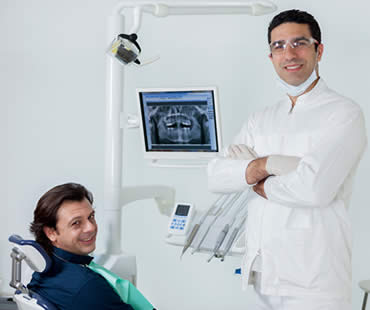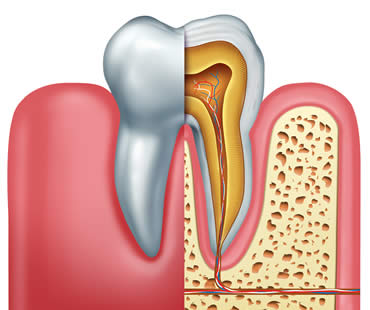
by Dr. Adkins | Jan 17, 2020 | Blog, Dental Topics 2, Root Canal Treatment
If the prospect of a root canal procedure has you running for the hills, you may want to consider reading over this list of frequently asked questions before you end up cowering in a corner:
- What is root canal therapy? Root canal treatment is performed when decay or trauma has damaged a tooth causing it to die. A dentist or endodontist performs a procedure to remove the diseased or damaged pulp from the tooth and then refills the tooth cavity.
- Is root canal therapy painful? In reality, root canal treatment is intended to relieve pain, not cause it. Because the procedures are very similar, you should experience no more discomfort than having a cavity filled.
- What happens after root canal therapy? Your tooth may be slightly sensitive for a few days, but over-the-counter pain relievers are usually sufficient to relieve any pain you may experience. In order for your tooth to return to full functionality, a crown or other restoration will need to be placed after the root canal therapy is performed.
- What if I opt not to choose root canal therapy? Untreated damage or infection in your tooth can travel through the roots and lead to an abscess or larger infection.
- Is there an alternative to root canal therapy? You could relieve the pain and infection by having your tooth removed. However, this can cause problems such as bone loss, migration of teeth, and bite problems.
In the case of a severely damaged or decayed tooth, the ideal solution is to save your natural tooth through root canal therapy and restoration. Contrary to popular belief, a root canal procedure is no more uncomfortable than having a filling placed in a cavity, and can have enormous benefits to your long-term oral health. Consult with your dental professional to get answers to any other questions or concerns you may have regarding root canal therapy so you can alleviate your fears and return to your healthy smile.
We treat patients from McDonough and the surrounding area

by Dr. Adkins | Jan 10, 2020 | Blog, Dental Topics 2, Dentures
If you have been living with a mouth full of badly decayed teeth, infected gums or painful tooth infections, your dentist may have talked to you about how dentures can transform your smile. While no one wants to extract all of his or her teeth and have no remaining natural teeth, if your teeth have been a source of pain and embarrassment to you for years, having a beautiful new set of dentures could sincerely change your life.
Dentures are very natural-appearing replacements for an entire mouth of missing natural teeth and gum tissue. Dentures are removable and can be cleaned thoroughly each day, unlike examples like dental crowns or dental bridges that are permanently affixed to your mouth.
Badly decayed teeth and other oral issues can lead to chronic pain that spreads from the mouth to other areas of the face, head and neck. This pain can disrupt your life, leaving you irritable and moody, causing you to isolate yourself. Pain medications can lead you to feel groggy or off-balance, affecting your interactions with others in a negative manner. Once those teeth are removed and any underlying infection is addressed, you will be shocked at how much better you feel. The absence of this once-ongoing pain will feel as though you are free of a great burden you hadn’t realized you were carrying.
Years of poor oral health might have left you unwilling to smile broadly, or to be uncomfortable in public speaking, laughing or eating and drinking. You may avoid friends and family and you might choose not to form new relationships easily. Once your damaged teeth have been removed and you have been fitted for dentures, you will be amazed at the “new you.” The bright, perfect white smile that greets you in the mirror may look like a movie star’s smile, but in fact, it’s your smile. With your new dentures, you can feel confident as you move through life.
We look forward to seeing you in our McDonough dental office

by Dr. Adkins | Jan 3, 2020 | Blog, Dental Topics 2, Root Canal Treatment
A toothache can make your life miserable. It may involve terrible tooth pain as well as headaches, sleeplessness, and difficulty eating. A trip to the dentist’s office is a must if you want relief. An examination might reveal that you need root canal treatment to save your tooth and eliminate your symptoms.
Severe tooth decay, a faulty crown, repeated tooth procedures or trauma are common causes of tooth damage. These issues can also lead to infection of your tooth’s pulp, which is on the inside of your tooth. Also called endodontic therapy, root canal treatment focuses on getting rid of the damaged tooth pulp. If infection is present, it is also removed. The root canal is thoroughly cleaned and disinfected, and then the area is filled with a special material called gutta-percha. Finally, the tooth is typically restored with a dental crown to provide maximum protection from future damage.
Some of the benefits you can expect from root canal treatment include chewing with normal biting force and sensation, maintaining natural tooth appearance, protecting other teeth from excessive wear, and avoiding a troublesome gap in the smile. In as little as one or two appointments, these benefits can be achieved without a great deal of discomfort. Innovations in technology have made the experience of root canal treatment usually no more painful or difficult than simply getting a dental filling. Once root canal treatment is complete, the tooth can last a lifetime with regular checkups and proper oral hygiene.
Schedule your appointment at our McDonough dental office

by Dr. Adkins | Dec 20, 2019 | Blog, Dental Topics 2, Root Canal Treatment
Root canal therapy is a painless procedure performed when decay has caused enough damage to a tooth that the tooth is dying or has already died. During treatment, your dentist or endodontist removes the diseased or damaged pulp from the tooth and then refills the tooth cavity. To ensure a successful and pleasant treatment, here are some basic do’s and don’ts to follow:
- Do take any medication your dentist has prescribed for you to take prior to root canal therapy.
- Don’t anticipate pain; be calm and relaxed during your treatment.
- Do expect mild discomfort for 2-3 days following the procedure. Apply an ice pack and sleep with your head elevated to minimize swelling.
- Don’t skip on taking prescribed pain medications, even if you are not experiencing extreme pain.
- Do avoid biting on hard foods or meddling with the affected tooth during the course of treatment.
- Don’t drink excessively hot or cold beverages until the completion of treatment.
- Do continue normal brushing on the root canal treated tooth.
- Don’t smoke or drink alcohol within 24 hours of root canal therapy.
- Do eat a soft diet for several days and avoid chewing on the treated tooth until a permanent restoration is placed.
- Don’t delay having the treated tooth capped with a crown or other restoration to avoid fracture or additional damage, causing failure of your root canal therapy.
- Do contact your dental professional immediately should you have any complications or questions during your recovery, and make sure to keep any follow-up appointments scheduled by your dentist or endodontist.
Root canal therapy has a 95% success rate. By following these simple guidelines, you can help to ensure a positive result from your root canal therapy and enjoy many more years of a healthy smile.
Our dental office is located in McDonough

by Dr. Adkins | Nov 29, 2019 | Blog, Dental Topics 2, Teeth Whitening
It’s a fact of life that teeth can become dingy and yellowed through the years. Your diet, age, personal habits and more affect the shade of your teeth. Even with the best care, it’s nearly inevitable that at some point you’ll want to brighten your smile. Once you pursue teeth whitening, you’ll want to be sure to make your new smile last as long as possible.
Over-the-counter products are readily available from your local drugstore and simple to use. However, they can take a long time to obtain full results and even then, you may not achieve the desired shade you’d like. Professional teeth whitening is the fastest and most dramatic way to brighten your smile.
If you spend the time and money to whiten your teeth professionally, making it last will be important to you. Results can last for a long time, but probably not forever. Here are some tips for making your white teeth last longer:
- Watch your diet especially carefully for the first 48 hours following treatment. Your teeth are at the most risk for staining during this timeframe.
- For the first few days, avoid eating known staining foods like blueberries, beets, dark soups, marinades, sauces, curry or tomato products.
- At first, avoid broccoli, green beans, peas, sprouts, corn, or skinned potatoes. These have increased risk of particles getting stuck into the highly susceptible tooth pores after whitening treatment.
- Watch out for citrus fruits that are high in acidity, which can also make your saliva more acidic. Your teeth are more prone to damage from acid when they already have increased sensitivity from the whitening chemicals.
- Avoid drinking dark colas or coffee, since both can stain your teeth no matter when you drink them.
- Get in the habit of drinking from a straw so that dark colored drinks don’t come into as much contact with your teeth.
Choosing the right foods and drinks after teeth whitening can make a big difference in the length of time your teeth stay white. Make the best decisions to enjoy your bright smile.
If you live in the McDonough area contact us today

by Dr. Adkins | Nov 22, 2019 | Blog, Dental Information, Dental Topics 2
Many people find foods such as cheese, yogurt, and milk to be a very enjoyable part of their diet. Not only are some of these dairy items tasty and nutritious, did you know they can also help your teeth and gums? Studies show that consuming dairy products regularly can lower the occurrence of dental diseases. Let’s see which dairy items you should consider incorporating into your diet and why.
Reduce gum disease
The primary benefit of dairy to your dental health is lowering your risk of periodontal disease. Also known as gum disease, this condition affects roughly 75 percent of Americans at some level. It may be minor gingivitis or advanced periodontitis. If left untreated, gum disease can cause tooth loss, contribute to heart disease and stroke, and worsen diseases like diabetes and osteoporosis. Lactic acid is one of the key ingredients in many dairy items, and researchers believe that lactic acid is related to reducing gum disease.
Choose your dairy
Just because a food is identified as a dairy product, that doesn’t necessarily mean it’s completely healthy for you. Here are some tips to help you choose the ideal foods and beverages for your dental health:
- Look for low fat and non-fat options.
- Choose white milk instead of flavored milk, such as chocolate. The added sugars can lead to tooth decay.
- Consider natural and organic products when possible.
- Select unsweetened yogurt without sugar or artificial sweeteners. A good alternative is Greek yogurt which you can add fruit or honey to create an appetizing, healthy snack.
Enjoy additional benefits
Avoiding gum disease isn’t the only benefit of eating dairy. It helps build strong teeth and bones, and is rich in vitamins that are good for your overall health. So the next time you get hungry, try some cheese or a glass of milk because these foods will not only satisfy your hunger but also keep you smiling.
Our dental office is located in McDonough








 (470) 665-5292
(470) 665-5292  E-Mail Us
E-Mail Us 
